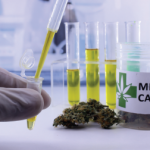Many of Bachhuber’s patients ask for help quitting highly addictive opioids, and some have used marijuana to taper off the prescription painkillers, he said.
Nonetheless, a 1970 federal law puts cannabis in the same category as heroin, Schedule 1 of the Comprehensive Drug Abuse Prevention and Control Act, and finds it has no medicinal value. Consequently, doctors can only recommend, not prescribe, marijuana, and physicians who work for the federal government cannot even discuss the weed.
Federal prohibition also has led to severe limitations on marijuana research.
In January, a National Academies report found conclusive or substantial evidence that cannabis can effectively treat chronic pain, chemotherapy-induced nausea and spasticity. The report, written by an independent panel of medical experts, found no evidence of cannabis overdose deaths.
It did, however, find links between cannabis use and an increased risk of vehicle accidents, as well as the development of schizophrenia or other psychoses, particularly among the most frequent users.
Bachhuber lamented the dearth of research on the best ways to use marijuana as medicine.
“We have information that it works based on the National Academies’ report,” he says. “But we don’t know who it works best for, at what dosage, for how long.”
Last week, U.S. Attorney General Jeff Sessions, the nation’s top cop, reiterated his concerns about marijuana and heroin, an illegal opioid.
“I am astonished to hear people suggest that we can solve our heroin crisis by legalizing marijuana,” he told law enforcement officers in Virginia, “so people can trade one life-wrecking dependency for another.”
Reference
- Shi Y. Medical marijuana policies and hospitalizations related to marijuana and opioid pain reliever. Drug Alcohol Depend. 2017 Apr 1;173:144–150. doi: 10.1016/j.drugalcdep.2017.01.006. Epub 2017 Feb 21.



